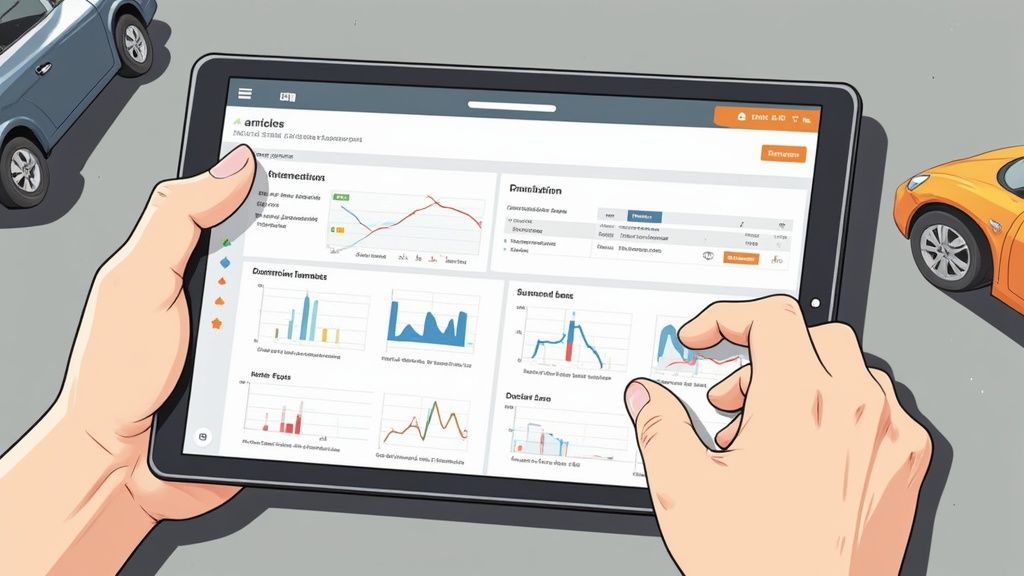
The Ultimate Guide to Logbook for Cars: Master Vehicle Record-Keeping That Actually Works
Why Most Vehicle Records Fail (And How to Fix That)
Most car owners start with good intentions when it comes to keeping vehicle records. They carefully document each oil change and fill-up, determined to maintain detailed logs. But as daily responsibilities pile up, that logbook gets forgotten in the glove box, only to resurface months later with gaps that make the records essentially useless.
Common Record-Keeping Mistakes
The biggest problem with traditional vehicle records is that they rely on outdated methods that are hard to maintain consistently. Paper notes get lost or damaged, glove compartment receipts fade, and even spreadsheets become disorganized over time. When you need to look up past maintenance details, piecing together a year’s history from scattered records becomes nearly impossible. This frustration leads many car owners to give up on record-keeping entirely.
Beyond the organizational challenges, old-school logbooks have limited practical value. A stack of receipts and notes can’t provide meaningful insights about maintenance patterns or help you make smarter decisions about your vehicle’s care. This is why many car owners are now moving toward digital solutions that offer more useful features.
Making the Switch to Digital
Auto Service Logger addresses these pain points by creating one organized digital home for all vehicle records. Think of it as a smart filing system that keeps every service record, repair note, and fuel purchase easily accessible whenever you need it. Whether you’re at home planning maintenance, talking to your mechanic, or selling your car, you’ll have your vehicle’s complete history at your fingertips.
Creating Lasting Habits
Of course, even the best digital tools only work if you use them consistently. The key is treating record-keeping as an essential part of vehicle ownership, just like checking fluid levels or tire pressure. For instance, make it a habit to log details in Auto Service Logger right after each fill-up while the numbers are fresh in your mind. The platform’s simple interface means you can complete entries quickly and get on with your day.
Understanding why good records matter also helps maintain motivation. A detailed service history does more than track costs - it helps extend your car’s life and preserves its resale value. By choosing the right tools and building consistent habits, you can turn vehicle record-keeping from a forgotten task into a valuable part of car ownership that pays off in the long run.
Building Your Perfect Vehicle Logbook System

Keeping accurate records is one of the most important yet overlooked aspects of car ownership. A detailed logbook not only helps track maintenance but also provides essential documentation for selling your car or making warranty claims. Instead of relying on scattered receipts and memory, a proper logbook system lets you capture and organize all the key information about your vehicle. Here’s how to create a logbook that works for your needs.
Essential Components of a Car Logbook
Think of your car’s logbook as its life story - a complete record that helps you monitor its health, spot problems early, and maintain its value over time. Here are the key details to include:
- Vehicle Information: Record the basics first - year, make, model, VIN number, and any specific details about your car.
- Maintenance Records: This is the core of your logbook. Note every service visit, from routine oil changes to major repairs. Include the date, mileage, work done, parts replaced, and costs.
- Fuel Consumption: Track your fuel purchases to monitor efficiency. Record the date, mileage, amount of fuel added, and cost. This helps identify if your car is using more fuel than normal.
- Repair History: Document all repairs in detail, both big and small. Note what broke, how it was fixed, parts used, labor costs, and repair shop information. This creates a paper trail for warranty claims and shows future buyers the car was well maintained.
- Other Expenses: Include related costs like insurance, registration fees, and car washes. This gives you the full picture of ownership expenses for budgeting.
Structuring Your Logbook for Maximum Usefulness
A well-organized logbook makes it easy to find information when you need it. Consider these organizing principles:
- Chronological Order: Enter records by date to create an easy-to-follow timeline. This helps track service intervals and spot patterns.
- Mileage-Based Tracking: Note odometer readings with each entry. This is crucial for following maintenance schedules and understanding wear over time.
- Categorization: Group entries by type (maintenance, repairs, fuel, etc.). This lets you quickly locate specific information.
Digital vs. Physical Logbooks: Choosing the Right Fit
While paper logbooks work fine for many people, digital options like Auto Service Logger offer some clear benefits. Digital logbooks keep all your records in one searchable place, safe from damage or loss. They often include helpful features like maintenance reminders and expense tracking tools. Your choice between paper and digital depends on what works best for your habits and comfort level with technology. The most important thing is consistency - record new information right away, whether after service visits or fill-ups. This ensures your logbook stays current and gives you a complete picture of your car’s history.
Making Technology Work for Your Records

Digital tools have made it much easier to maintain detailed records of your vehicle’s history. Gone are the days of rifling through crumpled receipts stuffed in your glove compartment - now you can keep all your car’s information organized and accessible in one place. The key is selecting the right digital solution and using it effectively.
Choosing the Right Digital Logbook
When selecting a digital logbook, consider what features matter most for your needs. Basic apps track mileage and fuel, while more full-featured options like Auto Service Logger let you store documents, monitor vehicle data, and create custom reports. Some platforms offer one-time payment options instead of subscriptions. Take time to evaluate different options and pick one that matches how you want to track your vehicle’s records.
Avoiding Technology Pitfalls
While digital tools are convenient, it’s important to protect against data loss. If you only keep records on your phone without backups, losing your device means losing your entire maintenance history. That’s why it’s smart to choose a platform with reliable backup features, such as Auto Service Logger’s cloud storage system.
Combining Traditional and Digital Methods
Using both paper and digital records can give you the best of both worlds. For example, you might jot down quick notes about fuel stops in a small notebook, then transfer those details to your digital logbook later. This provides a backup while letting you take advantage of digital tools for organizing and analyzing your data. Keeping physical copies of important receipts also gives you a safety net.
Accessibility and Data Ownership
Think about how and where you’ll need to access your records. Can you view them from any device, or are you locked into one platform? Auto Service Logger works across computers, tablets and phones, making it easy to check records anywhere. Also consider whether you can export your data - this gives you control over your information and lets you switch platforms if needed. By keeping these factors in mind, you can create an organized, accessible system for tracking your vehicle’s complete history.
Turning Your Records Into Real Value

A well-kept car logbook does more than just track basic information - it helps you make smarter decisions about maintenance and get more money when it’s time to sell. When potential buyers see detailed records of your vehicle’s history, they gain confidence that translates directly into better offers.
The Resale Advantage: Demonstrating Value
Consider this scenario: Two identical cars are for sale. One comes with scattered old receipts and vague maintenance notes. The other includes complete documentation through Auto Service Logger, showing every service visit, repair job, and fuel fill-up with exact dates, mileage readings, and costs. Most buyers will naturally gravitate toward the car with the thorough history, since it proves responsible ownership and reduces worries about hidden problems. This documented care often commands a higher price.
Beyond Resale: Predictive Maintenance and Cost Savings
Regular record-keeping helps spot potential issues before they become expensive problems. By tracking fuel economy and mileage over time, you can notice subtle changes that might signal developing mechanical troubles. Finding and fixing these small issues early prevents them from growing into major repairs. This proactive approach, guided by your detailed logs, saves money in the long run through timely maintenance.
Building Buyer Confidence: Presentation Matters
The way you organize maintenance records makes a big difference when selling. A chronological logbook with clear sections for routine service, repairs, and modifications helps buyers quickly understand your car’s history. Including original receipts for parts and labor adds credibility to your documentation. This organized, thorough approach builds trust and shows buyers they’re getting a well-maintained vehicle.
Documenting Modifications and Warranty Compliance
Careful records protect your interests when it comes to modifications and warranty coverage. Noting aftermarket parts and performance upgrades, along with when they were installed, provides transparency that certain buyers value highly. For warranty purposes, documenting scheduled maintenance proves you’ve followed requirements and helps avoid coverage disputes. In this way, thorough record-keeping safeguards both your car’s value and your investment in it over the years.
Mastering Business Vehicle Documentation
Proper car logbook management becomes essential when vehicles are used for business purposes. What starts as simple record-keeping turns into a vital part of financial oversight and tax compliance. For fleet managers and business owners, maintaining detailed records is key for maximizing tax deductions while staying compliant with IRS requirements. Let’s explore proven strategies for effective business vehicle documentation.
Separating Personal and Business Use
The foundation of good business vehicle documentation is drawing a clear line between personal and business mileage. This distinction is central to determining your eligible tax deductions. Much like a pie chart, your total mileage splits into two segments - business and personal use. The greater your documented business mileage, the higher your potential deductions. Tools like Auto Service Logger help classify each trip, making it simple to calculate business use percentages when tax season arrives. This clear separation provides the documentation needed to support business expense claims to the IRS.
Tracking Deductible Expenses
A complete car logbook captures more than just mileage - it records all business-related vehicle costs. This includes fuel, maintenance, repairs, insurance, registration, and even car washes. For example, getting an oil change during a business trip becomes a deductible expense. Without proper documentation in your logbook though, you may miss claiming these valid deductions. Good records create a clear trail that protects you during potential IRS reviews. Detailed expense tracking also helps spot spending patterns and find ways to reduce costs.
Maintaining Audit-Ready Records
Should you face an audit, well-kept logbook records become your strongest defense. The IRS has specific requirements for documenting vehicle deductions. A messy stack of old receipts won’t meet their standards. Your logbook needs to clearly show each business trip’s date, purpose, destination, starting and ending mileage, and related expenses. Keep supporting documents like fuel receipts and repair invoices to back up your records. Think of it as building evidence - organized, detailed documentation makes the strongest case. Auto Service Logger helps by providing digital storage for all supporting documents in one accessible place.
Managing Multiple Vehicles
The record-keeping challenge grows when tracking multiple business vehicles. Monitoring mileage and expenses across a whole fleet demands a solid system. Digital tools shine here by gathering data from different drivers and vehicles into one central platform. This gives you a complete view to analyze patterns, spot trends, and ensure consistent documentation fleet-wide. Beyond saving time, good organization reduces errors that could cause problems during an audit.
Creating Sustainable Record-Keeping Habits
Tracking car maintenance can start off strong but frequently loses steam after a few weeks. By approaching vehicle documentation thoughtfully, you can turn it into a natural part of your car care routine that delivers real value over time.
Building a Routine that Works
Just like scheduled maintenance keeps your car running smoothly, consistent record-keeping helps track your vehicle’s health and expenses. Make logging part of what you already do - when you fill up with gas, take a moment to note the mileage, fuel amount and cost in Auto Service Logger. The mobile app makes this quick and simple, even while you’re out. After service appointments, snap a photo of the invoice and upload it right away. This creates an organized digital history and prevents lost paperwork.
Overcoming Common Obstacles
It’s easy to forget to log details over time. Set up reminders on your phone or in Auto Service Logger for regular maintenance items like oil changes and tire rotations. These notifications help you stay on track with both logging and proactive car care. Pick a specific time each week or month to review your records and fill in any gaps. Even 15 minutes helps reinforce the habit and catches missed entries.
Turning Data into Actionable Insights
A logbook becomes truly useful when you use the information to make smart decisions. Auto Service Logger’s reporting tools help you spot trends in fuel efficiency and repair costs. For example, if you notice gradually declining gas mileage, it could signal a developing issue. Catching problems early often prevents more expensive fixes later. Understanding your car’s maintenance history also helps budget for future work and get fair value when selling.
Staying Motivated for the Long Haul
To maintain good record-keeping habits, focus on the concrete benefits. Picture showing a potential buyer detailed maintenance records through Auto Service Logger - this history builds their confidence and can increase your selling price. The connection between consistent logging and better resale value provides ongoing motivation. Regular records also give peace of mind, knowing you have documentation if warranty questions arise.
Ready to make vehicle record-keeping work for you? Start your free trial with Auto Service Logger today and experience organized, insightful maintenance tracking that adds real value. Click here to get started!